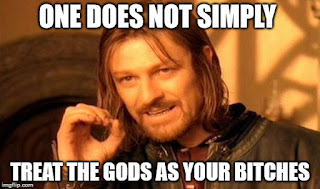Was Mani Responsible for Life?
 The other day I had several awesome ideas for blog posts. They were full of insight and witty
The other day I had several awesome ideas for blog posts. They were full of insight and witty
thoughts. I even put the ideas down in drafts so when I was out of clever ideas, I could just start on one.
Note to self: don’t put down ideas when you’re sleep deprived. No, they aren’t that wonderful.
So, for these reasons, the post is a bit late. I also had some errands I’ve had to run on Saturday, so sue me. In retrospect, I may salvage a few of the pieces. I’ve salvaged at least one of them. In this case, I’m writing about the moon and how scientists think that it may have something to do with the development of life on our planet. You see, I was looking up at the beautiful strawberry moon on solstice and feeling thankful that we have it. So, this post is about the moon and why we should be glad it is in the sky.
 A Bad Moon on the Rise
A Bad Moon on the Rise
I’ve thought about going down the direction of the full moon jokes, but that would be childish and immature. Which is why I’ve broken down and yes, gone that direction, because I’m not above being childish and immature. So, let’s get that out of our systems right this second and get down to mooning.
Why Our Moon is so Special
Our moon isn’t like other moons in our solar system. Most moons either formed while the planets were being formed and were stuck in their orbit around the planet. Either that, or the moons were captured by the planet’s gravity and are hanging in there for the time being. If you look at the various planets and moons, you’ll notice something peculiar about our planet with our solitary nightlight and the rest of the planets and their moons. Namely, our moon is not only solitary, but it’s big when compared to the mass of the Earth.
It is more than a quarter of the Earth’s size at 27 percent. In fact, no other planets have such a size ratio at 4 to 1 — all other moons we know about are much smaller than their planets.
Our moon actually formed from a collision between the Earth and another, smaller, protoplanet that scientists have named Theia. The theory (and BTW, if you’re having trouble with the word, “theory,” read this) is that some 4.5 billion years ago, only a very short time (relatively speaking) after the Earth came into being, some 30 to 50 million years, Earth and Theia were vying for the same space. Both protoplanets were still very hot and were still forming, so when they crashed into each other, something interesting happened. Theia didn’t smash headlong into the Earth; rather, the blow was more of a glancing blow. The result caused matter to be ejected from the Earth and Theia to get partially swallowed up. Both planetoids as they re-coalesced became locked in each of the other’s gravitational pulls. The moon is identical in composition to our Earth, which along with computer simulation models provide the explanation to its existence.
So, that alone makes our moon special, but what is really interesting is that without our moon, we may not have had life form. Here’s the explanation.
How the Moon may have Helped Bring about Life on this Planet
 We don’t think of Mani as a creator god, but the moon has helped our planet evolve the life we see today. First off, the moon is responsible for stabilizing our Earth’s axis. Without it, the axis would wobble mightily and we would experience vast changes in our temperature to the point where Earth would be inhospitable to life. Imagine the axis tilt so extreme that we are plunged into a terrible cold so no life would have been able to evolve.
We don’t think of Mani as a creator god, but the moon has helped our planet evolve the life we see today. First off, the moon is responsible for stabilizing our Earth’s axis. Without it, the axis would wobble mightily and we would experience vast changes in our temperature to the point where Earth would be inhospitable to life. Imagine the axis tilt so extreme that we are plunged into a terrible cold so no life would have been able to evolve.
Secondly, the tides the moon creates exposes the land to both air and water, forcing evolution to select for creatures that reside in these tidal areas that could thrive in both environments, thus setting the stage for land creatures.
Other Effects the Moon has on our Planet
The moon has also had the effect of slowing the rotation of our planet, thus lengthening our day to nearly 24 hours. Our planet has, in turn (excuse the pun), changed the rotation of the moon to 27.3 days, which is the same time as it takes to make a complete orbit around our Earth. This is why we always see the same face of the moon. Our planet’s rotation continues to slow because of the moon (due to tidal friction), but it would take 9 billion years for the moon to actually slow our planet to the moon’s orbital rate.
The moon is slowly moving away from our planet, and it was once much closer. We had more significant tides then and the pull on the Earth’s mantle may have set the state for plate tectonics.
The Gift of Metals
 One cool thing to consider is that our moon has given us metals on and close to the surface. You see,we suspect the iron migrated to a small core.
One cool thing to consider is that our moon has given us metals on and close to the surface. You see,we suspect the iron migrated to a small core.
scientists have modeled planet such as the Earth forming and when it cooled, all the metal should have migrated to the Earth’s core. But it hasn’t. That’s because when Theia hit the proto-Earth, it splattered much of its core across the Earth’s mantle. Our planet spewed a portion of our mantle to form the moon and thus we received the gift of metals from the moon’s earlier version. Our moon shows no iron in its rock —
How Mani has Affected Mankind
Without the moon, we wouldn’t have the tides that we do (we would have tides from the sun, but they would be minuscule.) We would have very dark nights every night; it’s unlikely we would’ve been able to hunt at night, or perhaps we would end up with greater night vision. We wouldn’t have eclipses, or obvious ways to divide our year into months (the word, “months,” is derived from “moon.”) We wouldn’t be able to advance technologically without metals. Think about it. What if we couldn’t get copper, tin, iron, and other metals easily?
I’m Not the Only One Waxing About Mani
Apparently I’m not the only one waxing about Mani. There’s a cool article in Witches and Pagans that deals with Mani. Mani being the brother of Sunna and the son of Mundefari, he’s one of the god that we know little about. He is pursued by the wolf, Hati, who will consume him on Ragnarok. The Witches and Pagans article mentions that he is the protector of abused children and also those who are emotionally distressed or suffer mental illness. I don’t know if that is UPG, current folklore, or if that is mentioned somewhere in legends. I haven’t done that much research about him, but I often feel comfort and joy looking up at the moon.
So, there you have it. My take on the moon. Hopefully he brings you as much joy as he brings me.





















